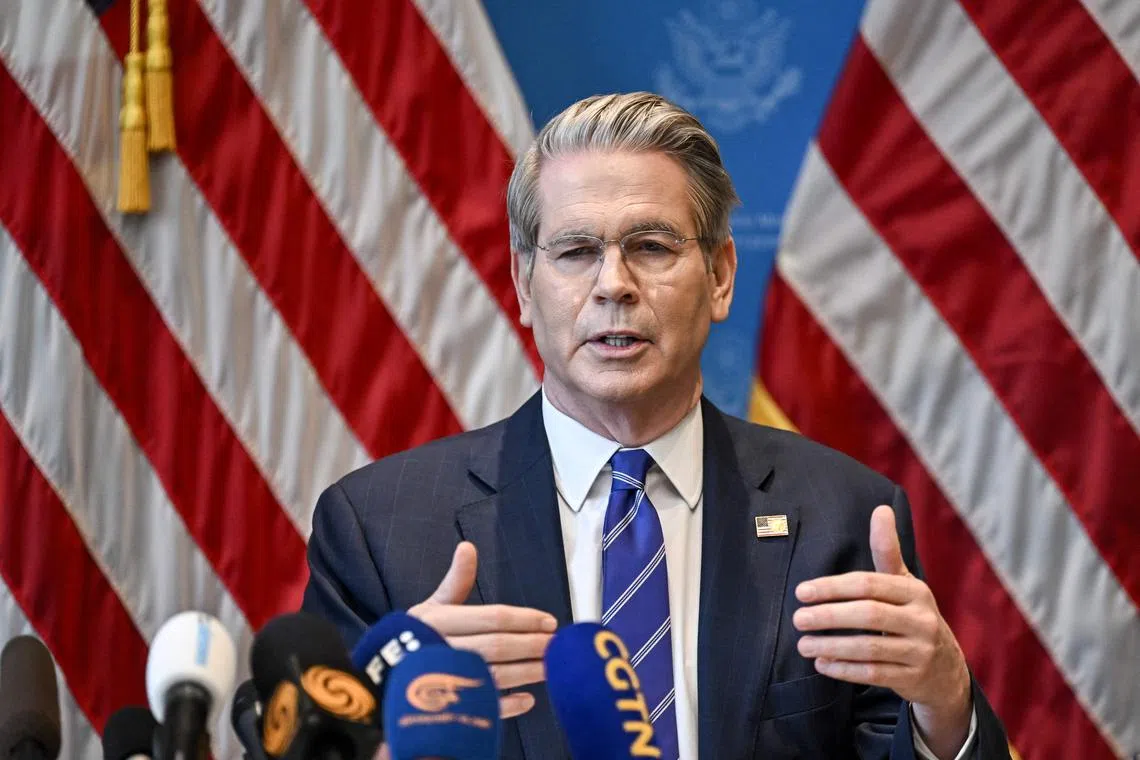US Treasury Secretary Bessent emerges as possible contender to succeed Fed chief Powell
Sign up now: Get ST's newsletters delivered to your inbox

US Treasury Secretary Scott Bessent is leading US President Donald Trump’s sweeping global trade overhaul.
PHOTO: AFP
Follow topic:
WASHINGTON - A growing chorus of advisers inside and outside the Trump administration are pushing another name to serve as the next chair of the Federal Reserve: Treasury Secretary Scott Bessent.
US President Donald Trump said on June 6 he would name a successor “very soon” to replace Mr Jerome Powell, whose term as Fed chair ends in May 2026.
The small list of candidates under consideration has included Mr Kevin Warsh, a former Fed official whom Mr Trump interviewed for the Treasury secretary role in November, according to people familiar with the matter.
But Mr Bessent – who is leading Mr Trump’s effort to kick-start the US economy with sweeping changes to trade, taxes and regulation – is also now one of the contenders for the job, said the people.
Formal interviews for the position have not begun, two of the people said.
“I have the best job in Washington,” Mr Bessent said in response to a request for comment. “The President will decide who’s best for the economy and the American people.”
A senior administration official, who spoke on the condition of anonymity, disputed the reporting without providing further specifics.
As Treasury chief, Mr Bessent would traditionally play a key role in the search and interview process for the next Fed chair. It is unclear if he would recuse himself as Mr Trump begins to make his decision.
“Given the amount of trust and confidence that the global financial community has in Scott Bessent, he’s an obvious candidate,” said Mr Tim Adams, president and chief executive of the Institute of International Finance (IIF).
“He’s a dark horse candidate,” Mr Adams said, adding that Mr Warsh – who served as a governor on the Fed board from 2006 to 2011 – would also be a good choice.
Asked specifically about Mr Warsh on June 6, Mr Trump said: “He’s very highly thought of.”
Mr Bessent has been at the forefront of negotiations on a US-China trade deal, arguably the most important of the pacts the President is seeking to forge as part of his effort to reshape the global trade landscape.
“Scott Bessent proved he could implement President Trump’s agenda during an incredibly turbulent first six months,” said Mr Steve Bannon, former chief White House strategist and outside adviser to the President. “He’s not just the star of the Cabinet, but a safe pair of hands for global capital markets.”
The President, who first nominated Mr Powell to the job in 2017, has regularly complained that the Fed chief has been too reluctant to cut borrowing costs.
Mr Trump pushed Mr Powell to lower interest rates in a White House meeting in May.
Mr Powell and Fed officials have held interest rates steady in 2025, arguing a patient approach to policy is appropriate amid economic uncertainty caused by Mr Trump’s expanded and evolving use of tariffs.
Fed policymakers have said they expect the announced tariffs to weigh on economic growth and boost inflation.
Whoever the Senate confirms for the post will have to prove to the world that the Fed’s independence from political meddling remains intact.
Mr Trump has said many times that Mr Powell is making a mistake by not lowering rates, and has previously said that he should have a say on rate decisions, raising questions over whether markets would see the next pick as beholden to him.
Mr Bessent or Mr Warsh “would be given the benefit of the doubt from the financial community” that they would preserve the independence of the Fed’s rate-setting authority, IIF’s Mr Adams said.
Other candidates whose names have previously been floated for Fed chair include the White House’s National Economic Council director Kevin Hassett, Fed governor Christopher Waller and former World Bank president David Malpass. BLOOMBERG

